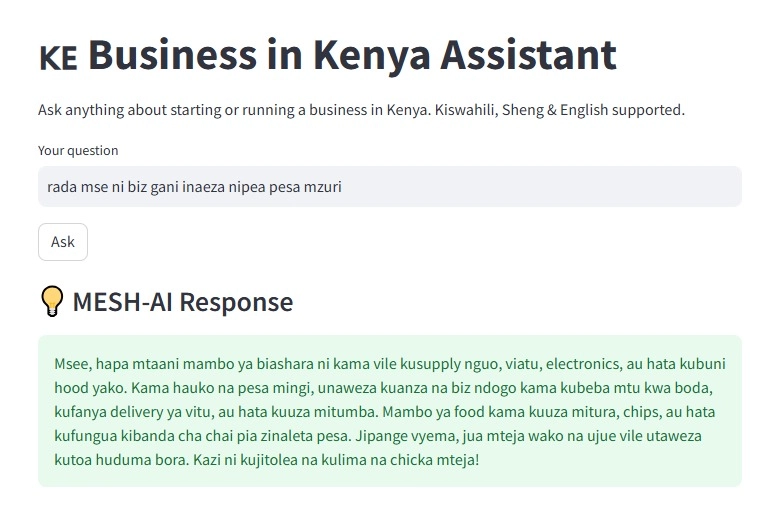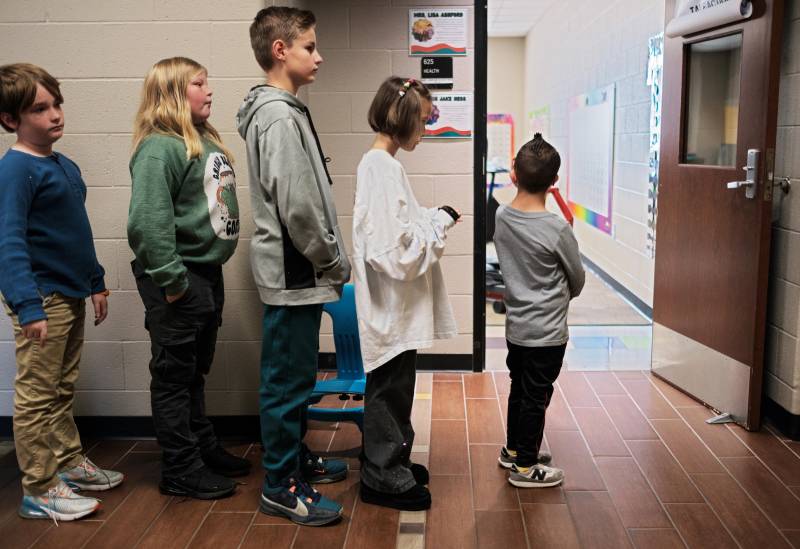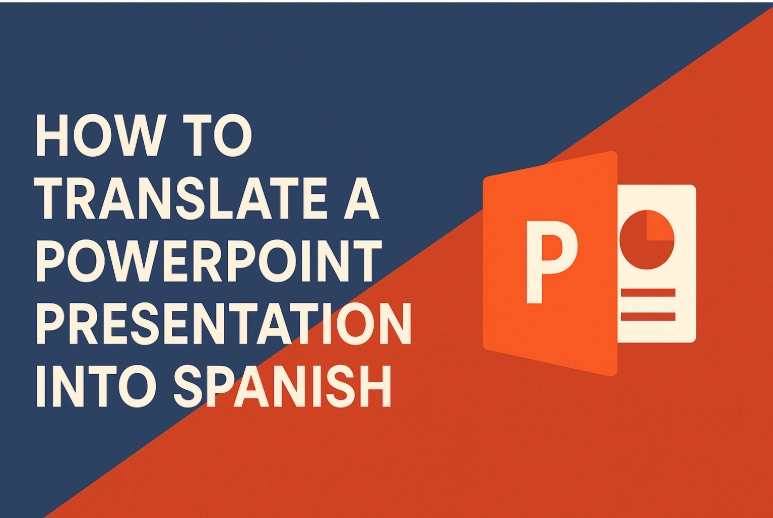Building a Multilingual Business Assistant for Kenya
How AI Can Bridge Language Gaps In Kenya's diverse linguistic landscape, providing business guidance across language barriers represents both a challenge and an opportunity. When I first demoed our AI business assistant, I was asked if our agent could understand a question in Kiswahili or Sheng. At that moment, the system couldn't. But I immediately knew this was critical — especially because the majority of the client's audience are "waseh wa mtaa" (neighborhood community members and hustlers), who often mix Kiswahili and Sheng in daily conversation. I quickly realized something important was missing - the rich linguistic diversity of Kenya's business community. The initial version could handle English queries well, but when asked questions in Swahili or Sheng, it fell short. That's when I knew we needed to go deeper into local language support including Kiswahili and Sheng, the popular urban slang. The Problem Worth Solving Kenya's business landscape is vibrant but fragmented by language. Many "waseh wa mtaa" who could benefit from business advice are more comfortable communicating in Kiswahili or Sheng rather than English. Traditional business resources often fail to reach these entrepreneurs because of this language gap. The Solution: A Multilingual AI Assistant For now a simple, powerful tool powered by OpenAI's GPT technology, wrapped in a lightweight Python + Streamlit application. The goal? Help anyone ask questions about starting or running a business in Kenya, whether in Kiswahili, Sheng, or English. Here's a snippet of what that looked like: Now, the assistant can detect if someone is speaking in Sheng or Kiswahili and respond appropriately, staying authentic to how people actually communicate. When I tested it again — asking a question fully in Sheng: rada mse ni biz gani inaweza nipaea pesa mzuri the assistant responded perfectly in a casual, streetwise tone: Why This Matters This demo is simple — it's running on very limited context. I don't even have a proper API to pull structured business information dynamically yet. I'm relying purely on basic keyword matching and GPT's ability to infer and generate. Imagine the possibilities: If they expose a structured API or database with real business opportunities. If we feed it updated, hyper-local information (even specific to different parts of Nairobi or Kenya). If we continuously fine-tune or add memory. We could deliver super-accurate, culturally fluent AI support to thousands of hustlers, shop owners, and entrepreneurs — in the exact language they use every day. The Language Detection Breakthrough Here's a peek at how we implemented multilingual support: def detect_language(text): text_lower = text.lower() swahili_clues = ["biashara", "jinsi", "kampuni", "nchini", "kodi", "shirika", "huduma", "nitaanzaje"] sheng_clues = ["msee", "biz", "shugli", "kuomoka", "hustle", "ngeta", "mbogi", "keja", "naanzaje", "nduthi", "mpesa"] if any(word in text_lower for word in sheng_clues): return "sheng" elif any(word in text_lower for word in swahili_clues): return "swahili" else: return "english" This simple yet effective language detection system allows our assistant to identify whether a user is speaking Sheng, Swahili, or English based on keyword clues. For our target audience, this Sheng support can be a gamechanger in making the technology feel familiar and accessible. Tailoring Responses to Local Context Once we detect the language, we customize the assistant's persona accordingly: def get_system_message(language): if language == "swahili": return "Wewe ni msaidizi wa biashara unayetoa ushauri kuhusu kuanzisha au kuendesha biashara nchini Kenya kwa Kiswahili fasaha." elif language == "sheng": return "Wewe ni msee wa biashara Kenya. Toa maelezo kwa lugha ya mtaa (Sheng) kuhusu mambo ya biashara hapa mtaani." else: return "You are a helpful assistant focused only on giving advice related to starting and running businesses in Kenya." The Potential Impact This simple demonstration shows just the tip of the iceberg. Even with limited context and without access to structured API data, the assistant provides helpful responses. Imagine what would be possible with: Full API access to comprehensive business information in Kenya More extensive training on Sheng vocabulary and expressions Integration with local business registration resources Personalization based on location within Kenya Final Thoughts Data + AI + Local Context =

How AI Can Bridge Language Gaps
In Kenya's diverse linguistic landscape, providing business guidance across language barriers represents both a challenge and an opportunity.
When I first demoed our AI business assistant, I was asked if our agent could understand a question in Kiswahili or Sheng.
At that moment, the system couldn't. But I immediately knew this was critical — especially because the majority of the client's audience are "waseh wa mtaa" (neighborhood community members and hustlers), who often mix Kiswahili and Sheng in daily conversation.
I quickly realized something important was missing - the rich linguistic diversity of Kenya's business community. The initial version could handle English queries well, but when asked questions in Swahili or Sheng, it fell short. That's when I knew we needed to go deeper into local language support including Kiswahili and Sheng, the popular urban slang.
The Problem Worth Solving
Kenya's business landscape is vibrant but fragmented by language. Many "waseh wa mtaa" who could benefit from business advice are more comfortable communicating in Kiswahili or Sheng rather than English. Traditional business resources often fail to reach these entrepreneurs because of this language gap.
The Solution: A Multilingual AI Assistant
For now a simple, powerful tool powered by OpenAI's GPT technology, wrapped in a lightweight Python + Streamlit application.
The goal? Help anyone ask questions about starting or running a business in Kenya, whether in Kiswahili, Sheng, or English.
Here's a snippet of what that looked like:
Now, the assistant can detect if someone is speaking in Sheng or Kiswahili and respond appropriately, staying authentic to how people actually communicate.
When I tested it again — asking a question fully in Sheng:
rada mse ni biz gani inaweza nipaea pesa mzuri
the assistant responded perfectly in a casual, streetwise tone:
Why This Matters
This demo is simple — it's running on very limited context.
I don't even have a proper API to pull structured business information dynamically yet.
I'm relying purely on basic keyword matching and GPT's ability to infer and generate.
Imagine the possibilities:
- If they expose a structured API or database with real business opportunities.
- If we feed it updated, hyper-local information (even specific to different parts of Nairobi or Kenya).
- If we continuously fine-tune or add memory.
We could deliver super-accurate, culturally fluent AI support to thousands of hustlers, shop owners, and entrepreneurs — in the exact language they use every day.
The Language Detection Breakthrough
Here's a peek at how we implemented multilingual support:
def detect_language(text):
text_lower = text.lower()
swahili_clues = ["biashara", "jinsi", "kampuni", "nchini", "kodi", "shirika", "huduma", "nitaanzaje"]
sheng_clues = ["msee", "biz", "shugli", "kuomoka", "hustle", "ngeta", "mbogi", "keja", "naanzaje", "nduthi", "mpesa"]
if any(word in text_lower for word in sheng_clues):
return "sheng"
elif any(word in text_lower for word in swahili_clues):
return "swahili"
else:
return "english"
This simple yet effective language detection system allows our assistant to identify whether a user is speaking Sheng, Swahili, or English based on keyword clues. For our target audience, this Sheng support can be a gamechanger in making the technology feel familiar and accessible.
Tailoring Responses to Local Context
Once we detect the language, we customize the assistant's persona accordingly:
def get_system_message(language):
if language == "swahili":
return "Wewe ni msaidizi wa biashara unayetoa ushauri kuhusu kuanzisha au kuendesha biashara nchini Kenya kwa Kiswahili fasaha."
elif language == "sheng":
return "Wewe ni msee wa biashara Kenya. Toa maelezo kwa lugha ya mtaa (Sheng) kuhusu mambo ya biashara hapa mtaani."
else:
return "You are a helpful assistant focused only on giving advice related to starting and running businesses in Kenya."
The Potential Impact
This simple demonstration shows just the tip of the iceberg. Even with limited context and without access to structured API data, the assistant provides helpful responses. Imagine what would be possible with:
- Full API access to comprehensive business information in Kenya
- More extensive training on Sheng vocabulary and expressions
- Integration with local business registration resources
- Personalization based on location within Kenya
Final Thoughts
Data + AI + Local Context =






























































